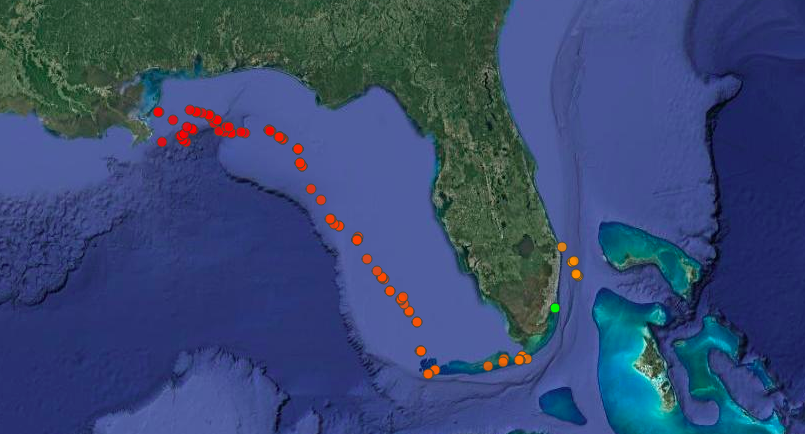INSTRUCTIONS
Explore dozens of satellite tracks by selecting a species and individual shark in the navigation bar to the right or at the bottom if viewing from mobile devices.
RESEARCH
These shark satellite tracks are part of an ongoing research project by SRC scientists to better understand the migratory routes and residency patterns of Tiger, Hammerhead, and Bull sharks in the subtropical Atlantic. To learn more, explore the detailed research page: GPS for Sharks.
ADOPT A SHARK
They may not be cute and cuddly, but sharks add beauty and diversity to our planet’s oceans. Their populations are in great decline, and researching these apex predators is neither easy nor cheap. To ensure SRC’s satellite tracking study of sharks continues, adopt a shark!
A tax-deductible $3,000 donation will cover the cost of one new SPOT tag. In return, you will be given the opportunity to name your shark and follow his/her movements on our website using Google Earth.
Classes and entire schools are also welcome to collectively adopt sharks. What a way to enrich your educational experience!
Learn more on the Adopt A Shark page.
F.A.Q.
Why does a shark transmission stop?
Satellite tags are essentially fancy computers attached to live sharks. There are a number of things that can happen to a tag once it is released.
- In order for a tag to transmit the shark must break the surface of the water. This can sometimes be infrequent and sporadic.
- Our tags are equipped with enough battery life to sustain up to a year of transmissions. However, this number is variable depending on the frequency a shark transmits. More transmissions will cause a tag to lose battery quicker.
- Satellite tags are designed to eventually pop of a shark so the animal is not swimming with it indefinitely. The tags are attached using titanium that will corrode in saltwater; the length of the corrosion process varies with conditions in the water such as salinity and temperature.
- As a shark heals the tag can actually get pushed right out of the fin.
- As the tag travels with a shark it can accumulate algae and other organisms. This can block the tag and prevent it from successfully transmitting.
- As sharks go through life there is potential for collision. For example, run-ins with other sharks or getting caught in a coral reef can break the tag and prevent transmission.
Shark Tracks
GREAT HAMMERHEAD
SCALLOPED HAMMERHEAD
BULL SHARKS
BLUE SHARKS
MAKO SHARKS
BLACKTIP SHARKS
DUSKY SHARKS
PORBEAGLE
SANDBAR

